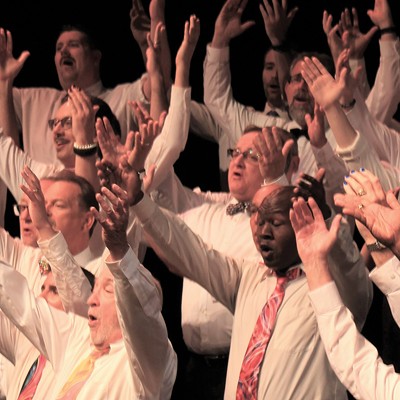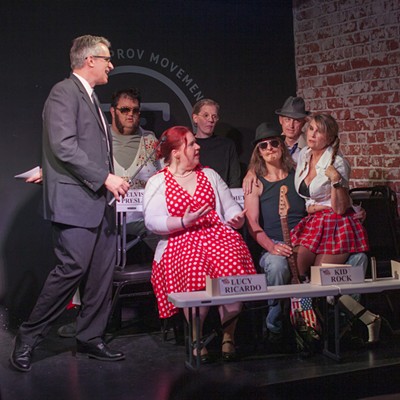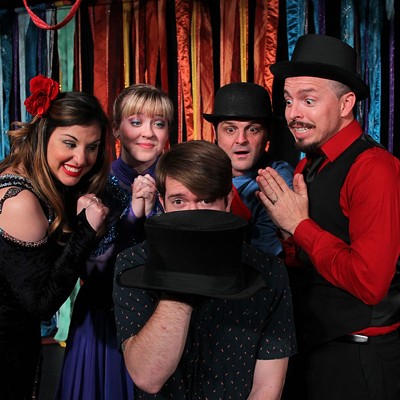Arthur Miller's Death of a Salesman and The Crucible are American classics. Lesser-known is Miller's first theatrical success, his 1947 drama All My Sons, currently being produced by Live Theatre Workshop.
Watching LTW's production, one can't help but think that All My Sons might speak to today's concerns more urgently than Miller's better-known works, which is perhaps the reason why the play is having a mini-renaissance. (It was revived on Broadway in 2008.)
All My Sons explores the relationship between war and commerce, showing the moral ramifications of a business decision taken in wartime. These themes, far from being dated, are painfully resonant in today's political climate.
The action takes place outside of a family home in suburban Ohio two years after the end of World War II. The set (designed by Richard and Amanda Gremel) depicts a porch decked in bright, cheerful colors. The naturalism is broken only by World War II-era posters pasted on one wall, which serve as a reminder of the recent past.
The family patriarch, Joe, played by David Alexander Johnston, at first seems like a lovable figure. He jokes with a neighborhood kid, Bert (Alexander Hupp). He tries to gently defuse the delusions of his wife, Kate (Peg Peterson), who thinks their eldest son, Larry, an airman who went missing during the war, is still alive. And he mentors his surviving son, Chris (Christopher Johnson), in the family business.
Trouble starts with the arrival of Ann (Marissa Garcia), who was engaged to the missing son. Chris now wants to marry her, but that will, of course, upset Kate's fragile hope that Larry will return.
This conflict stirs up other suppressed drama. Ann's father—Joe's former business partner—is in jail for manufacturing flawed cylinder parts for military airplanes during the war. Though they were in the business together, Joe was exonerated of all wrongdoing. Chris believes in his father's innocence ("You're the only one I know who loves his parents," Ann comments), but others do not. Ann's brother, George (Steve Wood), turns up to accuse Joe.
As the truth starts to come out, the characters vacillate between deceit and denial. The cast does an excellent job with this difficult material: Johnston is particularly noteworthy for his textured performance as Joe, the loving but deeply flawed father.
Miller set The Crucible against the backdrop of the Salem witch trials as a way to portray the paranoia of McCarthyism. In the same way, All My Sons—though a contemporary drama when it was written—plays vibrantly in a 2012 America going through the winding down of the Iraq conflict, with all of its unanswered questions and sorrows.
Director Glen Coffman and LTW do not make any overt contemporary references, but they bring All My Sons to life in a capable way that cannot help but leave you in a reflective mood.
Jason Robert Brown's The Last Five Years (produced off-Broadway in 2002) is the first musical that Winding Road Theater Ensemble has attempted. The troupe has started small: The one-act show requires only two cast members. It tells the story of a failed marriage between a novelist, Jamie (Brian Levario), and an aspiring actress, Cathy (Amy Erbe).
The two-hander works well in the limited space of the Cabaret Theater at the Temple of Music and Art. (The play moves to St. Francis in the Foothills on Jan. 20.) Director Terry Erbe also created the set, which is a serviceable painted backdrop of New York City.
Scenes from the marriage take place in several locales; Levario and Erbe are required to suggest where the characters are in terms of space and time using only facial expressions and a few costume changes. They do this admirably. (Amy Erbe also designed the costumes, which are basic contemporary pieces that carry us through the five years that pass during the show.)
The setup is pretty simple—two people sing about their relationship—with one twist: Cathy starts the story of their time together at the end of the marriage, while Jamie begins with their first date. Thus, they tell the tale from different directions, meeting only on their wedding day.
The wedding is also the only moment when the two performers look at each other; the rest of the time, they sing to an imagined other. While this is a neat visual metaphor for the way two people experience the same relationship differently, it's difficult to feel invested in a romance that you never really see.
Erbe has arguably the stronger voice, while Levario has more charisma as a performer. This works well for the characters. Levario's Jamie is driven by ambition. His early songs, which Levario pumps full of energy, are as much about his excitement over his professional achievements as they are about his wife.
The show's theme seems to be that one partner's early success can take its toll on a marriage. Cathy's career has not taken take off as Jamie's has; her best number is A Chorus Line-style audition. According to Jamie, Cathy is not supportive of his success. According to Cathy, Jamie is off in "Jamie-land."
This gets to the heart of the show: It's essentially a sung-through "he said, she said." Watching it is a bit like being trapped at a party where someone you don't really like wants to talk your ear off about his relationship problems. In short, neither sweet-voiced Erbe nor enthusiastic Levario could get me to care about Jamie or Cathy. Both characters come off as cripplingly self-absorbed.
Ultimately, I found neither Brown's score nor his characters lively enough to engage me. But in terms of the production aspects, Winding Road has done well with its first musical; it will be interesting to see what the company does next.










